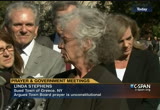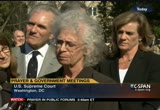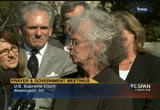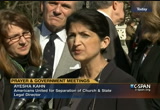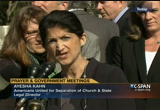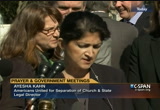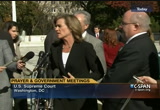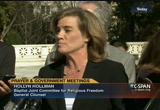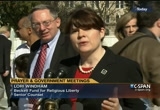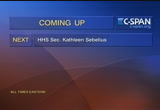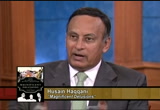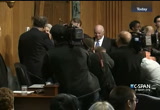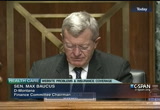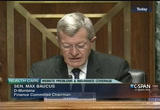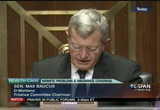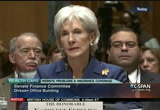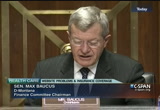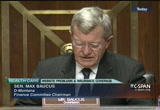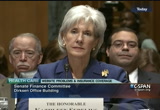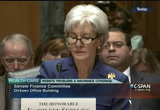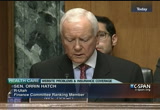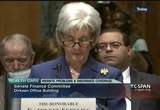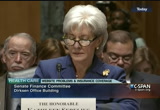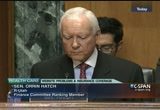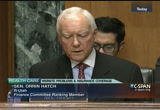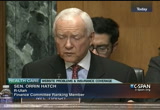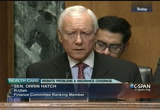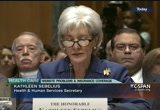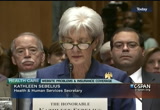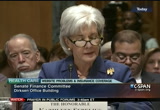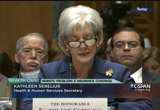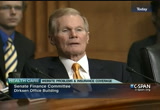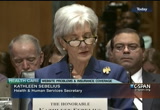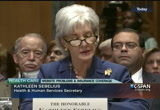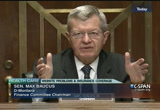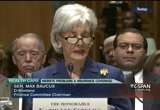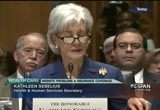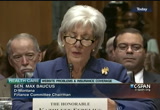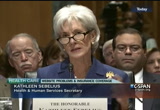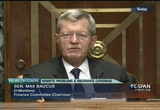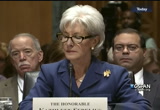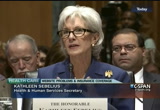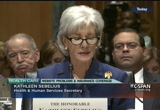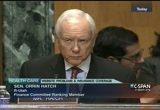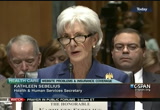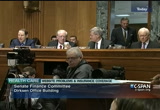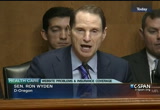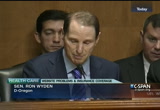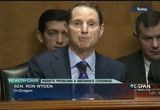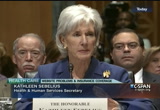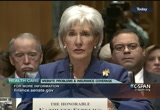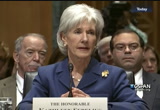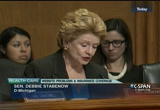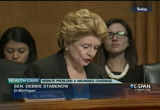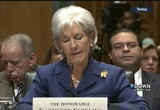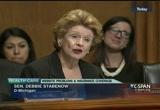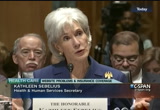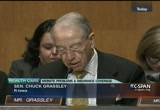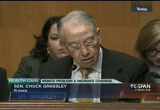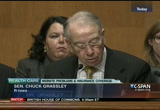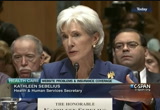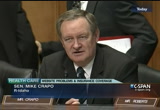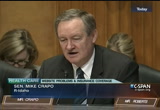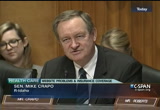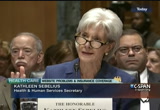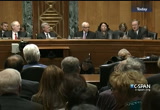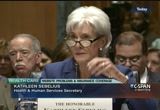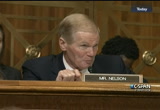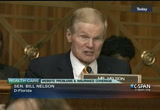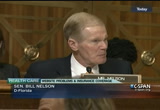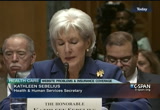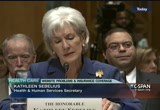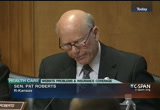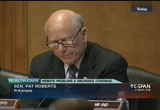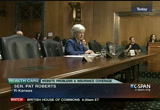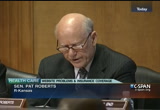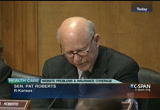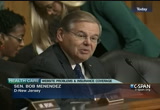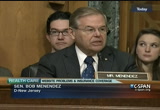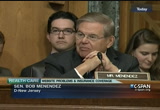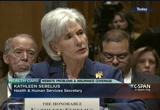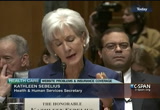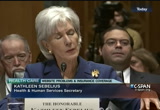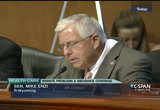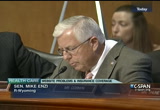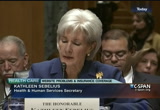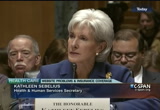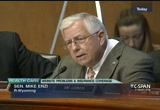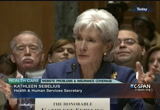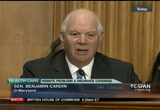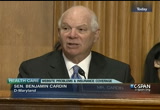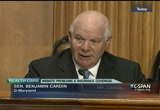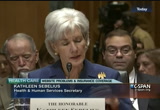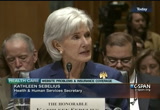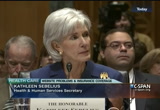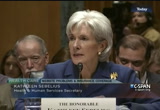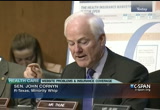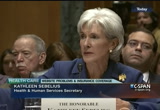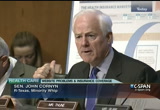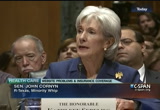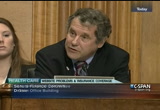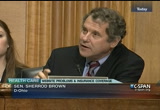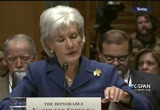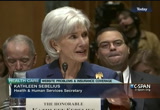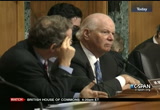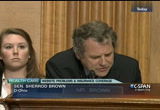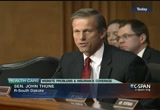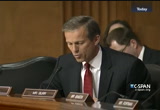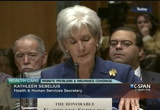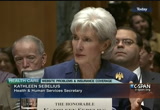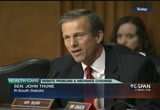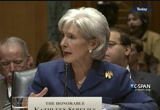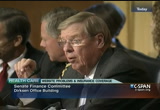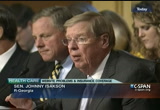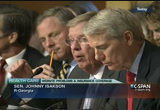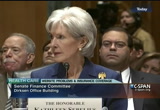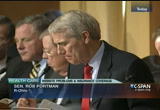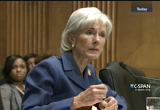tv Key Capitol Hill Hearings CSPAN November 7, 2013 12:00am-2:01am EST
12:00 am
session from conservative christians. they bashed him and said two prayers for the one he disagreed with the previous time. so it is hard for atheist or other minorities to speak up because susanna and i have both experienced hostility from our fellow residents in the town of greece. it is not a pleasant experience. susan and i got two letters telling us to stay away from town board meetings if we did not like what was going on, to move out of the town if we did not like it. i had vandalism to my house several times. one night someone came in the i. i had vandalism to my house several times. one night, someone came in the middle of the night, dug up my mailbox and smashed it and put it on my car.
12:01 am
someone dismantled a fire hydrant near my home and threw it in my pool in the backyard. things like that. >> do you think the supreme court decision will change any have experienced. class time will tell. this has been mentioned in the media. why is it that christians who profess to be moral and upstanding people, would do such things? >> any thoughts on the question? >> i like very much the way the session began. i thought her questioning was excellent. >> do you think it will ever get easier? eliminate a set of rare or these rails test these , the town> four years of greece had a moment of silence. in 1999, the new supervisor
12:02 am
changed all that for the race. [indiscernible] know.o not >> do you know if it was related to this case? >> i believe it was. this all happened when the case was being discussed in the local media. i have no doubt it was related. >> thank you. >> i am the legal director of americans united for separation of church and they. united has been so proud since 2008 to have bins on -- sponsored this case. we got involved in the case for a very simple reason. we believed what the town of greece was doing was wrong. participating in one's local
12:03 am
is a universal right of citizenship. onshould not be condition recitation of the lord's prayer or participation in any other fray are to a particular faith tradition. town residents attend these meetings as participants. singlen's sports teams words. exercising the rights and seeking important benefits should not be conditioned on bowing one's head in left mission of the divinity of christ. weis important to understand are not asking the board to discontinue its practice. of presenting prayers. we are asking citizens not the presser -- pressured to
12:04 am
participate in the prayers and that they be nondenominational and inclusive. is "in god weotto trust" and not in christ we trust. our pledge of allegiance refers to one nation under god and not one nation under god -- jesus, allah, or buddha. chosen tof greece has thumb its nose at this long- standing constitutional tradition that has served us so well. residentstown's view, who participate in these meetings could be asked to join in a prayer that promises eternal hellfire to anyone who .oes not accept jesus christ that cannot possibly be constitutional. we hope the supreme court would agree civic participation should not be conditioned on conference rising one's religious scruples.
12:05 am
thank you. have --sts do not believe in god. they should not hear even denominational prayers. >> yes. country hason but followed does not recognize the increasing diverse city of the country. we will leave under the proposal we have made that atheists would he allowed to come forward and present a prayer, as would or anybody else who comes from a more diverse tradition than the monotheistic one the court opened with today. >> thank you. >> my name is holly. the general counsel of the baptist joint committee for religious liberty.
12:06 am
a brief on behalf of respondents to stand with them along with the united church of christ and the press. church usa. we are religious organizations that stand for religious liberty. in this case, we stand with those who challenge a prayer practice that would make their political rights incumbent on their participation in a prayer with which they do not agree. one thing the court clearly is in the principle
12:07 am
of religious liberty and that one's political standing should not depend on their adherence to religion. in this environment, the town council and other governments where there is erect interactive participatory relationships, it is improper for the government engages citizens in an act of religious worship. this is not a position against prayer. all religious people should pray for their elected officials but it is very important to understand it is not the role of government to lead in religious act. when it does, there will be practical problems, theological problems, a myriad things that the court talked about today that can't be resolved consistent with our tradition of religious liberty to protect all people, whether they believe or do not believe. without harming government or religious congregations. hollyn hollman. >> thanks. >> i'm with the fund for religious liberty. we believe that religious freedom is critical to the
12:08 am
constitutional protection. the town of greece permitted christians, jews, wiccans, to give invocations and recognized religious diversity. allowing these kind of prayers does not harm our society, it recognizes and respects our religious diversity and our religious freedom. we are encouraged by the arguments this morning and are hopeful the supreme court will issue a decision that recognizes the freedom of our nation and our long history of permitting legislative pairs. thank you. quest coming up, kathleen sebelius testifies before the senate finance committee.
quote
12:09 am
then, president obama is in dallas am talking about the law. later, remarks calling for a delay in implementing the health care law. >> coming up on the next differentn journal," types of renewable energy and the politics shaping the industry.
12:10 am
>> the head of the consumer financial protection bureau is morningwed thursday about consumer protection priorities. you can see it live starting at 8:10 a.m. eastern on c-span two. [captions copyright national cable satellite corp. 2013] [captioning performed by national captioning institute]
12:11 am
pakistan needs to be happy with security with india, as long as there -- pakistan has nuclear weapons in india has nuclear weapons. now, pakistan to trade with and address economic dysfunction with the 48% of children who do not go to school in school, and make sure pakistan's population does not continue to rise at a pace much faster than economic growth. none of those things can be addressed just by building relationships. >> the former pakistani ambassador to the u.s. on the painful history of pakistani and american relations. sunday night at 9:00, just part of book tv this weekend on c- span2. >> the health and human services secretary was on capitol hill for the second time in two week
12:12 am
12:13 am
>> we will come to order. in february, 1958, against the backdrop of a divided nation, a junior senator from massachusetts spoke at a college in baltimore. the young senator, named john kennedy, said -- let us not despair the act. let us not seek the republican answer or the democratic answer, but the right answer. let us not seek to fix the blame
12:14 am
12:15 am
span.org -- launched healthcare.gov. it was to be the premier website for the affordable care act. needless to say, it has been a rocky rollout. problems have plagued the website. let me say right off the bat that this is unacceptable. it has been disappointing to your members of the administration say that they did not see the problems coming. secretary sibelius, last time you came before this committee i used to year -- two words about -- two words to relate my worry over the law's implementation. make no mistake, i believe in this law. i spent two years of my life working on the affordable care act, there is nothing i want more to succeed. months ago i warned that if implementation did not improve, the marketplace might struggle. other senators voiced similar concerns. when we asked for updates on the market places, the responses we got were completely unsatisfactory. we were told multiple times that everything was on track. we now know that that was not the case. now it is time to move forward. madam secretary, you deserve credit for coming before the american people in accepting the responsibility of the websites problems.
12:17 am
the focus is where it should be, on the future. it is clear to me that you're working as hard as you can to fix healthcare.gov. keep that it. when this law was created we made a promise to the american people. a promise to fix a broken system . a promise to ensure that all americans have access to quality, affordable health care, we made a promise to make sure that no one ever went broke just because they got sick. you must make good on that promise. some people have called for your resignation. we cannot fix the blame for the past. you need to stay at hhs and help get the marketplace working. recently you said you expected the website to be running smoothly for the majority of users by late november. there is no room for error. you must beat, and i say beat, that deadline. why? these marketplaces open the door to quality health insurance for millions of americans. 7 million americans will get insurance for marketplaces and 2014 according to projections. 10 years in, that number will grow to 24 million. there is no question that that cannot happen unless the marketplace runs at full speed. i believe that you will fix the problems because you know how critical the marketplaces are. for the first time ever consumers having guaranteed access to high-quality insurance. consumers will never be forced into bargain basement plans or refused coverage of cases like childbirth or cancer treatment. they will never be denied coverage because of pre-existing conditions or cut off because they hit an annual or lifetime limit.
12:19 am
we already have concrete examples of how the marketplaces are helping real people. consider these stories from the letters i have received from october 1. gary, from billings, montana, said that the monthly premium he pays for his family of four is just over $2000 but thanks to the affordable care act for next year it will be 1160 five dollars, saving $800 each month. allison in wolf point, montana, wrote to say that thanks to the act she will have access to affordable insurance for the first time in almost 20 years. she suffered an injury in college and because of that pre- existing condition the cost of insurance was prohibitive. instead she rationed visits to the adapter and cut back on the outdoor activities that make montana so great. no skiing, hiking, horseback riding, but now she will have access to high-quality insurance that she can afford. tony, a small business lawyer from bozeman, montana, wrote in to express his excitement on how it will save his small business $10,000 each year. he wrote -- as a small business owner, i can emphatically state that the affordable care act is not only good for my business, it is the only way that i can continue to provide to give health insurance to my family and employees. the staffing, training, the hard things that is business needs to stay competitive, he added it is good for his company, himself, his employers and family. a pretty impressive list. i have no doubt that stories like these will keep coming in in the weeks and months ahead. madam secretary, i was glad to hear you set a target rate for healthcare.gov to be fully operational. i look forward to hearing you plan to meet that goal. shedding light on where things stand, what the administration is doing to correct his problems as they -- and if there is a role for congress to help, we want to be there.
12:21 am
that is what matters right now. as resident kennedy said, let us not despair, but act. let's not seek the democratic or republican answer, but the right answer, let's get this done. >> thank you, mr. chairman. thank you for scheduling today's hearing. thank you, secretary sabia lias, for being here today. it has been six months since he last appeared before the committee. given everything that has gone on since that time, particularly regarding the implementation of obamacare, i would say that today's appearance is long past due. in april you assured us that the implementation was on track and that all was going smoothly and that the exchanges would be ready to go by october 1. it now appears that your statements from the previous hearings were at best misinformed. from where i sit, things do not seem to be going smoothly at all. i think we would all agree that the best part of the implementation of the so-called affordable care act has been an absolute debacle. you admitted as much last week when you testified before house energy and commerce committee when you said -- hold me accountable for the debacle, i am responsible. while i am glad that you are accepting the sponsor ability for this disastrous rollout, i would have preferred to you in the administration were honest with us to begin with. perhaps he really did believe that things were on track in april, but you must have had several indications before october 1 that there were problems with the website and the exchanges. it is simply inexcusable that the members of this committee were not told earlier that these problems were occurring. it was not for want of asking. i personally sent you a number of letters asking for details on the information and implementation of the health care law. many of which were ignored entirely. the attitude toward the senate committee with the jurisdiction over your agency is to -- has simply been appalling and needs to be rectified. if the past month has been any
12:22 am
12:23 am
proper that you provide us with more regular updates on the issues with which you are dealing. in fact, i would ask that you come here once per month for the next six months to advise this committee with status up its on the implementation of obamacare and i hope you will agree to do so. like i said, madam secretary, it is clear the problems you encountered so far were not on for scene. two separate problems, one from the government accountability office in june, another from the department of health and human service inspector general in august identified challenges months ahead of the october 1 deadline. yet there is no indication that the warnings from these nonpartisan government watchdogs were heated by the administration or that any thought was given to delaying the start up as a result. on april 1 i raise concerns about whether adequate that -- adequate testing was occurring to ensure that privacy controls were in place with the exchanges. in fact i specifically asked you about having an independent entity review the entire system before it went live to make sure that all the appropriate privacy and security controls were in place. you assured me that all testing protocols were being followed and that privacy issues were a high priority.
12:25 am
however, we now know that no end to end testing of the system occurred before the system went live. none. in fact he officials knew on september 27 that there was a high security risk to the system if it went on as planned. my colleagues and i sent several letters since the spring asking for more information. what privacy controls are being implemented as part of the exchange infrastructure? we asked for details about whether or not testing was being done to address the privacy and security concerns we had raised. to date we have not received any answers to those questions. so, not only can millions of americans not log into the website successfully, but those who have actually succeeded could now find themselves at the mercy of identity thieves across the globe. i would call this a less than ideal situation for our constituents. bringing us to another set of issues that i hope you will be able to shed some light on later today. let me start with a simple premise. words matter. we have all heard the golden saying that honesty is the best policy. unfortunately this wisdom does not seem to apply to the obamacare pledges. more and more promises made at this time -- or made at the time that this law was passed are currently proving to not be reality on a daily basis. that health care reform would reduce costs by $2500 for the average family. the truth is with all the new mandates going into effect, the cost of health insurance in this country is projected to rise at remarkable rate. some studies, including one from the manhattan institute, estimated that individual premiums will increase by 99% for females -- 99% for males and 62% for women nationwide. and then obama saying that if you could -- if you like your health care and like your doctor, you could keep it, this
12:26 am
has proven to be simply untrue. this is why "the washington post ," gave him for pinocchio's. this represents the highest level of untruthfulness. you really have to try hard to get for pinocchio's. you do not simply get it for making a misstatement. it was not until the last few weeks that people in the administration and the white house started trying to be right with the president said. let's be candid. it was not a new honest streak that change their tone, it was the fact that americans started receiving cancellation notices from their insurers. according to the associated press, 3.5 million people have received these notices so far. put simply, there is a long track record of broken promises to this committee and the american people with respect to how this law should or would work and the impact it would have. i hope that that will stop today.
12:28 am
answers like we don't know and we were wrong are perfectly acceptable as long as that is the truth. i want to thank you again, mr. chairman, for holding this hearing. as you can see, we have a lot to discuss. i want to thank you, madam secretary, for being here. i know it is not the most pleasant thing you can do, but the fact of the matter is that these are the jinnah questions that have to be answered by you and others in charge of these programs. i have not even gone into -- i expect he will be able to get this -- the i.t. problems solved , the information technology problems solved. that does not even begin to answer the questions about why small businesses are now -- will not employ more than 49 people because they trigger a huge, huge expense under this -- i think very poorly thought out plan to begin with. >> thank you, senator. secretary sibelius, thank you madam secretary for appearing today. i appreciate your taking time to explain what is going on here. obviously your statement will be included in the record. you know the drill. take as long as you want to summarize, this is a very important matter. tell us what you want to say. >> thank you, chairman, ranking members of the committee, i appreciate the opportunity to update the committee on the final implementation phase of
12:29 am
the affordable care act. the law that passed both houses of congress was signed by the president and upheld by the supreme court and gives millions of americans an opportunity to obtain affordable health coverage. this is the first opportunity for many americans to get coverage, including people living in pain with chronic illnesses, young adults whose employers do not offer insurance , and parents struggling to keep up with mounting bills. in the last five weeks, access to healthcare.gov has been a miserably frustrating experience for far too many of these americans.
12:30 am
it is unacceptable and i am focused on fixing it and am accountable. i recognize that there is an even higher level of accountability. accountability to the sick, the vulnerable, the struggling americans who deserve better health care. the impact on the lives of everyday people is getting lost. i know this because i hear their stories cause a -- stories, as i am sure many of you do. we have a team of experts working on an aggressive schedule so that the consumer experience on the web gets better every day. as the chairman has said, by the end of november they are committed to having the site
12:31 am
working smoothly for the vast majority of users. for we do not have is a fully functioning system yet that consumers need and deserve. we do have a plan in place to identify, prioritize, and manage the remaining axes across the system. we have reinforced our team with dozens of key personnel from the government and private sector,
12:32 am
including respected engineers, technology managers, and software developers, designers and analysts from company like oracle and red hat. they are helping to diagnose problems and making quick decisions to analyze, troubleshoot, prioritize and resolve issues in real time. as this work continues we know
12:33 am
that americans are shopping for plans, signing up and enrolling online on paper, on the phone, and in person. in fact, more than 2 million people have already called the call center with an average wait time of less than 30 seconds. i want to share with the committee a few indications of progress, what we have improved and what we intend to fix of the problems that remain. the two major areas of for -- of
12:34 am
focus our performance dealing with speed and reliability, and functionality, fixing the bugs and other problems in the system . in the first few weeks after the launch of healthcare.gov, users had to wait an average of eight seconds for pages to load, today takes typically less than a second. one month ago viewing the health land took minutes, today takes seconds.
12:35 am
many consumers use to see a blank screen at the end of the application process. today they see if they are eligible for financial assistance, the next step in the process. users are receiving far fewer error messages and timeouts and are now able to process nearly 7000 registrants per hour with almost no errors. we have made more than a dozen additional fixes this weekend,
12:36 am
allowing applications to be processed by additional insurers and allowing consumers to complete payments, approving the save and continue function, upgrading hardware so that the system can handle more users with greater stability. last night we installed more upgrades focusing on direct enrollment in improving the consumer experience. those upgrades will continue on an aggressive schedule between now and the end of november. we are making progress, but there is still a lot of work to do. some have asked -- why not just
12:37 am
to delay implementation of the new law until all the problems are fixed? there is a pretty straightforward answer. delaying the affordable care act would not delay peoples cancer, diabetes, or parkinson's. it did not delay the need for dental health services or cholesterol screenings or prenatal health care. delaying the affordable care act does not allay the foreclosure notices for families forced into bankruptcy by unpayable medical bills. it does not delay the higher cost that all of us pay when uninsured americans are left with no choice but to rely on emergency rooms for care. for millions of americans, delays are not an option. people's lives depend on this. too many hard-working people have been waiting for to long for the ability to obtain affordable health insurance. we want to save families from going bankrupt, we want to save the lives for more of our
12:38 am
friends and neighbors by allowing them to detect medical issues early. delay is not an option. we are still at the beginning of a six-month open enrollment that ends at the end of march. there is plenty of time to sign up for the new plan. i want to put this into perspective, mr. chairman. the average private insurance enrollment is about two weeks in a worksite. many public lands allow for four weeks of open enrollment.
12:39 am
medicare, the yearly open enrollment that is underway right now is six weeks long. the new marketplace was specifically designed for a long open enrollment, 26 weeks. those who enroll by the 15th will be able to access their benefits on day one. i am accountable to this committee and to the american public for getting the fix is in place. we are committing -- committed to getting healthcare.gov fixed so that millions of americans can get the financial and health security they have been waiting for. thank you, mr. chairman. >> thank you, you have addressed the principal question i was going to ask, namely that many people think the site should be shut down until it is totally fixed. i am going to ask that question. why keep limping along? why not just shut it down until it is put together the way it should be put together? many have pointed out that your fixes tend to have unintended consequences down the road. some other part of the system going into and after all the other fixes have been made. people ask why that has not happened.
12:40 am
we also know that every day there is a story that someone did not get on, blank page, security problems, that is a bad media campaign. it is negative, does not hurt you, it -- it does not help you, it hurts you. why not have it shut down and just have one bad story and then for as long as it takes, a couple of weeks, go back and get that gateway up and running? you indicate that it delays health care for a lot of people and i appreciate that, but one more time, why not just get it done right? i have this series of rules in my office, i will not go through the rules, but one of them is do it now, the second one is do it right the first time. why not shut down and do it right? >> mr. chairman, i am relying on the advice not only of the inside team and contractors, but a lot of the outside experts who
12:41 am
have come in to take a look at this system and they did a number of things along the way. they did a series of diagnostics, looked at the entire system and determined at the outset that healthcare.gov is fixable, that it is not fatally flawed, which was the initial report from many people. secondly, we have asked that question a number of times. would it be helpful to take down the whole system and make fixes along the way? we have been advised that that actually does not help, that it is better to do routine operations, some of which are hot patches that can be done while the system is fully running and others are better to be done in the maintenance between 1 a.m. and 5 a.m., when the user experience is low and we take the system down for periods of time. but given the fact that the various fixes, various functionality fixes, the code, have to be written in batches, it has been advised that you do not gain much from taking the
12:42 am
whole system down for a week or a couple of weeks, that it is better to do this on an ongoing basis. >> jeff science, who i think is somewhat in charge of fixing some of this as far as i can tell, says he has a punch list. and he is going to punch them out one by one. how many items are on that punch list? which of them have been punched out? when do you expect to do the end to end testing? >> jeff has come into help manage the operations between the contractors and the cms team and the aggressive fix schedules. he will be with us, hopefully, through this process. he has been enormously helpful in being a management lieutenant
12:43 am
with maryland, the cms administrator. i would say that there are a couple of hundred functional fixes that have been identified. they are in priority grouping. the first series of them has been underway. it depends on the night. it is hard to give you a moment by moment snapshot. there was a number that were done last night, hardware, additional installations were done over the weekend. at 5:00 or 6:00 each day it is really identified whether or not the testing for the individual coding fix can be actually apply that night. the list changes, but mr. chairman we will get you an
12:44 am
update and i would say that we are into the list and not where we need to be, but that it is a fairly aggressive schedule to get to the entire list. >> are you going to do an end to end? wax because the site is running, it is an to end daily. people are coming through every day and it helps to identify some of what we are seeing. what we are doing with live time and to end testing, we could go back and inform the tech team what needs to happen. >> speaking of, i want this to work. this is a two-way street, you have to tell us what is going on candidly, fully, so that we do not wake up in november and lo
12:45 am
and behold are still not there yet. >> secretary, as you know, for months i have expressed concerns about the privacy and security controls that have been implemented in this federally facilitated marketplace. now we know that key officials in the administration knew that there were privacy and security risks as well as serious operational issues that might occur if the exchanges went live on october 1. yet a decision was still made not to delay the launch until those decisions -- issues were fully addressed. many people, including myself, called for an independent entity, like the government accountability office, to conduct an end to end review of the marketplace to ensure that the privacy and security patrols -- controls were in place. i have a number of questions each about knowing -- about proceeding even though you knew that these issues would occur. when did you find out about the potential security risk to users of the website, number one? >> sir, i would say the preliminary report -- >> so, in august. >> minor, g i o had identified that there risks -- that there were risks -- gao had identified that there were risks that we took seriously. >> who briefed you on the potential security risks if the launch moved forward as planned? did anyone a brief you on the security risks? >> we discussed security on a regular basis with the operations team, but no one suggested that the risks outweighed the importance of moving forward, including our independent evaluator, who made recommendations to cms as required. >> i have been suggesting that since april. you said you felt strongly that the launch needed to proceed on the first for the americans that did not have health insurance so that they could get coverage is soonest possible. how did you balance that need with the risk that those americans might then fall victim to identity theft or have their personal information compromised why security controls? -- by security controls? how did you balance that? >> i share your concerns about individual privacy. i would say that the site was developed with the highest standards in mind. it is certified by the federal standard and we took very seriously the information in the hub that was specifically designed so that the federal government was not storing privacy information and actually access other secure government websites, but we tried to store
12:46 am
the minimum possible information. we do not collect personal health information. >> but you do collect numbers -- social security numbers. >> sir, we don't collect them. the hub is a router function that actually identifies social security numbers and verifies them with the administration, but that information is not kept and stored. >> do they not have to give their family income? like that is verified by the irs and homeland security. >> it is also on the hub. >> pinging the homeland security database, pinging the irs via best -- database, it is not storing unique information. >> what were the trade-offs with launching the exchange on the first rather than waiting until a later date? other pieces of the marketplace have been delayed through insufficient privacy and security controls. >> senator, again i would say that the standards that were set out for security controls were met. you mentioned end to end testing . there were features of the system that were loaded very close to the launch date. that is why, i think, the administrator chose to authorize a temporary authorization to operate and not a permanent, because you cannot permanently authorize an authorization until you have the entire system. we knew we had features in the system that we had chosen not to apply from the outset. the shopping feature, the spanish website, again those need to be tested before the system can be only authorized. >> can you tell the committee how many people signed up for health care under the current system? >> senator, we will have enrollment on -- enrollment numbers out next week. we are still working on particularly the 834's, the piece with insurers, we want to make sure that begin valid, accurate numbers. >> my time is up, mr. chairman. >> thank you, senator. madame secretary, a community meeting at home, oregonians tell me to do everything i can to stop what they see as ridiculous, petty bickering in washington and help to get results by working cooperatively.
12:47 am
in that spirit, as i told you, i am going to pass this morning on the blame game and for a few minutes, for this moment, even, let's just say the democrats and republicans are going to try to find some real common ground on this. the affordable care act that we discussed today focuses on expanding coverage and financial help to those who cannot afford insurance and more private sector choices for patients. before the affordable care act, the last health care reform was the expansion of medicare to provide prescription drugs to american senior citizens. it was enacted during the bush administration and is known as medicare part d.
12:48 am
like the affordable care act, is zeroed in on the same concerns, expanding coverage, expanding assistance to the needy with increased marketplace choices. medicare part d has been a huge success. anyone who doubts it ought to think about the terrific hearing the chairman had at the aging committee a few weeks ago where democrats and republicans all made the same point. the medicare prescription drug program has been a godsend to millions of seniors by offering lifesaving medicine. it has cost 30% less than the congressional budget office predicted. but the medicare prescription drug program, as you know, did not start out so hot. the reality of the first few months of that program was pretty much bedlam.
12:49 am
i went back and looked at the newspapers from that time. i will just describe a few of the headlines. "glitches in drug plan upset seniors." "medicare drug program is a wasteful disaster." "medicare blunders become a monster." these headlines about the medicare prescription drug program that democrats and republicans now together say is a success, the headlines of the medicare prescription drug program are exactly the types of headlines that have been written about the affordable care act in recent weeks.
12:50 am
fortunately the prescription drug program got fixed and they got the chance to get off the ground. if this had been repealed, millions of seniors today would not have access to life-saving drugs. not a single member of this committee wants that. so, my question to you is -- what, in your view, madam secretary, could democratic and republican senators here on the finance committee do to make the latest health reforms the success, the way the medicare prescription drug program has been? >> senator, i think it is always welcome to have elected officials in their home state give information to constituents about what the law says, what their options are, what choices they have and access the process . that would be enormously helpful. particularly to constituents who may not be web savvy. who may not know about the law, linna be following this, but definitely need the benefits. i do feel that there is no excuse for what has been a miserable five weeks. i am committed to the fix of the website, on the other hand i know the people are using it every day and that the experience is getting better every day, so i am again encouraging the folks to use the website, use the call center, enroll in person and in the health center, find a navigator in the webs -- in the neighborhood, it is inordinately helpful. we would love to work with the
12:51 am
committee on the issues that look down the road. not just that the marketplace that we were talking about, but really the impact of having the opportunity to look at delivery system changes. i noted the committee just came up with a bipartisan proposal around a huge issue for medicare seniors, looking at those kinds of frameworks that actually encourage higher value lower- cost care as we move forward with more americans insured.
12:52 am
i think that is one effort that should have a lot of bipartisan support. i would be encouraged, as you know, the affordable care act has a lot of features to deliver that -- the deal with sets of values for the medical dollars we are spending and how access to preventative care could actually change health profiles for millions of americans. those kinds of opportunities that are here -- >> thank you very much, senator. senator stab and now -- senator stab now -- stabinow? >> there is no question that
12:53 am
this website has to get fixed and no way to express the frustration. i want to address the affordable insurance that is out there and the response that the public has had wanting to get on the website, get information because they need heat -- need health care and health insurance. because of the time i want to move quickly, ask you a few questions, if you can do yes or no, that would be great. let me share with you a story from michigan that was highlighted in an article in the l.a. times that talked about a woman named judith, 48 years old, work in a department store, had an insurance plan that costs are $65 per month that was a -- was affordable, she thought she had insurance, but then she was diagnosed with cancer and found out that her plan had a $2000 annual limit for treatment, so she delayed her care and it got worse, she was in a difficult situation. madame secretary, after january 1, will judith or any other woman face a cap on their coverage for breast cancer
12:54 am
treatment? >> no. >> will judith or any other woman be charged more or be denied insurance just for being a woman? >> no. >> after january 1 will -- judith or any other woman have to fear being denied coverage by her insurance company because of breast cancer? >> no, she will not. >> these are all good things. some people in michigan certainly think so. i received a letter from greg miller, who said that his wife and he had a policy that covered their son and they received a notice this week that their son policy was being canceled
12:55 am
because it was not compliant with the aca. it had a high deductible and paid only one doctor's visit per year and had no preventative care with limited prescription drug coverage. in fairness, the insurer advised us to go to the health care exchange to obtain a policy. we had no problem accessing the exchange or navigating to the various policy alternatives with much greater coverage than the old policy. we certainly want to hear more of that. thank you for passing obamacare. after january 1, will his sons insurance policy he guaranteed to cover prescription drugs? >> yes. >> after january first, with his insurance cover important preventative screenings without out-of-pocket costs for the family? like yes. >> yesterday i heard from crystal, a small business owner in pontiac, michigan, who has not been able to afford insurance for three years. she admitted that before the affordable care act she was one of the people who was using the emergency room and adding to the cost of everyone else and their insurance. last month she went to healthcare.gov and was able to ensure herself quickly without interruption. she got a plan for $163 per month. she said to me that it is a payment she can live with and
12:56 am
she could not tell me how happy she was to finally have health insurance, especially at her age. madam secretary, we have heard concerns about small businesses for years that have struggled for insurance. i certainly at every meeting for years and years at every performance meeting have wanted to talk about this. can you discuss how pulling together small business owners like crystal in the market ways
12:57 am
will help them continue to afford insurance? >> small business owners, under the law, employers with less than full-time employment have no obligation to provide coverage, but many of them want to, it is how they keep, recruit, and retain the best employees. they are often in a market where they pay higher rates and have exorbitant costs if one of their employees gets sick or has a diagnosis. so, having an option, and small business owners can shop inside or outside the marketplace, but there will be new options within the marketplace with plans specifically for them and for the employers with fewer than 25
12:58 am
employees and low income workers, they may actually qualify for a new tax credit to provide that coverage up to 50% of the cost of insurance so that they are -- there are not only more choices and features but a larger pool, but for some a significant tax incentive for employer coverage. >> thank you, senator. senator grassley? >> thank you for joining us, madam secretary. you know of my interest in the claims act that brought 30 to $40 billion back, it is one of the best tools against fraud. i start by referring to a letter that you sent to congress on october 30. the letter states that the department does not consider qualified health benefits or other programs related to the oral facility marketplaces and
12:59 am
1:00 am
>> no, not to my knowledge. this was a legal discussion in our department. because these are private insurance lines, they are not government programs, the legal interpretation was that the insurance companies offering plans on the marketplace and offering plans off the marketplace should be treated the same. these are not public lands, they are private planes. >> did you discuss this issue with any provider prior to their decision to join? >> no. >> would you make the lawyers who reviewed this decision available to my staff so that we can ask follow-up questions to better understand why the decision was made to weaken the ability to use available statutes to protect taxpayer dollars? >> i would be glad to do that. we have not given up any authority over fraud. our department continues to have careful monitoring.
1:01 am
we can decertify plans, we can work with the attorney general. the state insurance departments are the regulators of these private insurance plans and private companies. they have a very aggressive anti-fraud effort. it was just the legal determination, since these are private companies, these are not dollars being paid for out of the medicare trust fund, these are private premiums they should not be declared to be government health plans. >> the medicare advantage plan is the same and so it is covered. >> actually, it is not the same. it is a private insurance plan but federal dollars are paid directly out of the medicare trust fund to the medicare advantage plan. this is different. individuals are paying free means to a private plan on the marketplace. >> my next question is long. can i reserve my time?
1:02 am
>> you may, absolutely. >> thank you, mr. chairman. i read your testimony -- i appreciate your commitment to making the website work. i am concerned that a lot of the discussion seems to imply that the problem we're dealing with is that we fouled up on the website and we hired a lot of experts, we are going to get it fixed and everything is going to be great. as the chairman asked would it not be better to hold off until we can get the website text, i want to expand beyond that. i am concerned not that you will get the website fixed or not but that we will get the law fixed. as i see it, we are now finding that the concerns many of us raised the four about whether the law was properly laid out in the promises made were real, are
1:03 am
coming true. the president said if you like your plan, you can keep it. not because of the website, but because of the way the law was put together, we now see that for millions of americans, 3.5 that we know what, they are getting canceled. 100,000 in idaho. way more than the percentage the president is talking about. the president promised you can keep your doctor. millions of americans are finding out they can't. the president promised we can cut the average family's premium by about $2500 a year. although i read your testimony where you talk about premiums going down, i do not know what datasets you were using because the data i am aware of show that the premiums are skyrocketing. they are not going down, they are going up faster than they were project before the law.
1:04 am
the president promised if your family makes or earns less than $250,000 a year, according to a million dollars, you will not see your taxes increased a single dime. and yet we have somewhere between $800 billion and over $1 trillion of new taxes that were delayed but are now starting to hit and squarely hit the middle class. squarely hit the middle class. my question to you is, isn't it time for a timeout? the law is not working as it was promised. website is not working. let's fix it. the law is not working. isn't it time for a timeout so we can go when they start premiums go up and not down. seeing the failure of
1:05 am
the law to occur. respectfully disagree about theassessment law working. there are millions of americans who have actually received benefits under the law. adults who million have insurance now because they are covered on the parents plan. there are seniors who are experiencing not only additional benefits in their medicare plan, but despite all of the accusations that somehow medicare advantage would cease to exist, we have a stronger and less expensive program today than we did. seniors80% discount for in their prescription drugs if they fell into the doughnut hole.
1:06 am
millions of americans who have private employer coverage now have no co-pays and no fromurance, everything cancer screenings to immunizations. we have the lowest health-care cost increases in decades. in the private insurance market. in medicare, and medicaid. -- noare at an all-time one >> you can go through those points, and those datasets you're talking about. some of those have occurred. on the flip side we are seeing millions of americans lose their health care. millions more seeing their premiums going up, and the price for some of these fixes that you're talking about is phenomenally higher. it time to go away and take a look at the areas of the law that simply are failing?
1:07 am
marketplace,n the the rates have come in about 60% ther than what congressional budget office projected those rates to be. >> the projection after -- not lower than actual fact. >> those were the projections of the rates, much like we heard senator wyden talk about the projections around medicare and -- make our -- medicare part d. >> the rates are going down? >> i did not say they were going down. i said they are lower than was predicted. millions of people in the market, they will actually for the first time ever have some financial help paying for their health insurance. >> we are going to have to move on here. >> one of the toughest public service jobs i ever had was the elected insurance commission of
1:08 am
florida. one of the most doubling insurance markets was the individual insurance policies. peopleuld happen is would be enticed to come in to cheap health insurance and then over time, as the group got sicker, there was no control on the rates. it would go up, and they found limited health insurance. that is what the affordable care act is trying to address. we are talking about the individual insurance policies. not the group policies. case, we nowcular have no lifetime limits. we do not have pre-existing conditions.
1:09 am
looking in your states and find many examples where the so-called cancellation fact, theyd, but in are going into a policy that is going to give them protections because of the 10 things that are required. in the affordable care act individual health insurance policies. colleagues ask my they look at this, please consider for example, a lady in that wasad a policy $54 a month. that sounds great. that is being canceled. when you got into the internals, as reported by cbs, lo and behold, she didn't have much coverage at all, and had she gotten a disease like cancer, she would have virtually had no
1:10 am
coverage. she's going to have that coverage under the policies and the individual markets that are covered under the aca. thing abouty one what is going on in the states. take a state like kentucky. they did their work. in the first month, they sign up 30,000 people. look at my state. states basically because of politics they decided not to do anything about it. up, notept money to set going to expand medicaid, and look at the difficulty that now the federal government has had in 27 up this exchange
1:11 am
states. why couldn't we have been like kentucky why couldn't we be like kentucky and be way ahead of the game? excuse forere is no the website not working. madam secretary, i am one of the ones that said, as i heard mr. chairman say, that people have listed your words when you criticized the fact the website was not working, and i said it was inexcusable. what legal authority do you all have to guarantee the contractors responsible for this not working will be held into account? we have significant contracts
1:12 am
with a number of key outside industries. see ti and to ssi are two of them. we have paid out a portion of the money that has been encumbered for the website built. on a not up and running sufficient level at this point and we have new management with one of our key contractors driving part of the fix. sure the funding delivers on the product promise. it is not there yet and that is the promised commitment. we are working to make sure as bills come in, they are clearly reviewed and that we have the
1:13 am
opportunity to make sure the havect we need and committed to is delivered. >> mr. chairman, i will make a final statement. as someone who has fought and bled for this and sincerely thinks it will work in the long run, i want to hold them account and burn their fingers and make for not being responsible in producing a product all of us could be proud. thank you, mr. chairman. >> madam secretary, i want to mock -- to remind everyone again how we got here today. committeeers of this -- details we only received assurances things would go smoothly. we started hearing from people
1:14 am
directly involved in implementation of the exchanges were deeply worried about the website's launch. in june, the government accountability office issued a report it should have served as a warning to you as a --hlighted information is implementation -- it was never addressed. by july, it was clear to me your department was being less than transparent about whether the exchanges would be ready by october 1. i introduced the exchange sunset at the 2013. my bill would have sunset the exchanges and the individual mandate for people unable to enroll starting october 1 as promised. august, we determined tasks remain to be completed in a short time. your main website contractor one behind onere falling
1:15 am
their highest priority items. thatne included and -- services were intermittently not available. several days later, the white hub isnnounced the data ready for operation. in mid-september, ems ordered a contractor to make a significant change to the system to require people to submit personal information before revealing any plans or associated costs. days before the launch, testing showed a few hundred visitors crashed the site. the next day, a decision was made to move forward to watch it knowing there would be a high security risk during testing. i believe you were given advice, counsel, and warning, from experts inside your agency and out, that the health care
1:16 am
exchanges were not going to be ready. i believe to protect the you put us in, jeopardy. millions of americans are scared and they do not know whether they will have coverage in a matter of weeks and do not know whether coverage will include. letters now getting from insurance companies they do not understand. more people are losing their insurance than are signing up on the web that. they are being directed to a website that does not work. about lifeften talk and death in the context it deserves. at this time, it is real and it may -- means the difference between life and death for many americans at a loss for what to do. we know fixing the website will never fix the uncertainty and ramifications that result from
1:17 am
this law. i have to wonder, if you have failed tos that you heed the warnings and ignored the calls for members of congress and proceeded to open the exchanges october 1, immediately followed by a promotional tool to tell everyone, it is a great problem to have. kansans do not think these are great problem to have. hometown, stephen wrote, i am completely disgusted. i have spent the last two days trying to get my application through. this could not be a critical issue except the insurance coverage i currently have is going away because of the new federal requirements. you yourself know this law has serious problems. you delayed half the deadlines notemployers and unions are for millions of other americans
1:18 am
.osing their health care their worry and fear are palpable. your main goal should have been to protect americans to assure their safety. in your zeal to implement this law, not warnings, not advice, not counsel would deter you from implementing the exchanges there you said america should hold you accountable. that is why today, i repeat my request for you to resign. >> thank you, senator. >> madame secretary, thank you for joining us this morning. the problems we are facing with the marketplace website are unacceptable, they need to be fixed immediately. i would like to put things in a historical perspective. the age-old plan is facing hurdles. problems the set show soul security. medicare is facing trouble. new problems in medicare bug trend it -- drug benefit. those are headlines from the early part of this decade. major programs that have come below in terms of the social safety net in this country and health care security. while this is an excusable, it is a challenge that has been faced time and time when any
1:19 am
program has been unveiled. i find it amazing that those that seek to ascribe blame have spent every waking hour of the last four years working to dismantle, destroy, obstruct, and impede the success of the affordable care act. they are concerned not about its failure, but about its success. what i hope we will focus on is how to succeed. i want to get a sense when those of us on the committee worked to put this together, we were under the assumption that state- controlled by republican legislatures or governors would put a higher premium on the love
1:20 am
of state rights than their dislike of the president or some ideological political opposition. which is why we are seeing far better success in states that have established their own marketplace. what is the consequence of having so many of the states not pursue their own marketplace and delegating it to the federal government? did you envision not having that many states? what has been the consequences of the burden of that?
1:21 am
around the constitutionality of the bill. there was uncertainty what would happen when the court declared it unconstitutional how those states would rea there was uncertainty what would happen when the court declared it constitutional. i would say it added to the uncertainty of how large the operation would be. having said that, we did have of 2013 for january states to officially declare whether they would run their own marketplace or not, and by the middle of february, a partnership plan. but we have 36 states who are using the federal hub at this point and i think that is significantly higher than people might have predicted initially
1:22 am
at the outset of the plan. had robust product offerings and those market laces, about a fourth of the insurers are brand-new, which is very good news to a lot of people who have been in a monopoly market for a very long time. they have choices, they have competition. >> it is fair to say that state run marketplaces seem to be having greater success at this point than those that are being say therally i would web features of the state markets are running more smoothly, if you think about one set of products and one set of prices in one state that is less all of the, but states as well as the federal markets are using the hub,, and into the federal market to income andurity and
1:23 am
status. >> one last question, because we are hearing from a number of providers including health centers, for example in my state that did not set up its own exchange, that insurance companies have yet to provide the networking contracts. that is a function of the adequacy,e to ensure we are going to say that state insurance regulators are responsible for certifying the how is ite plans, possible, how are people supposed to shop for a plan if they don't know who is there dr. when the network is not yet in place, and will those networks be in place by january 1? ostile. how are people supposed to shop for a plan when the network is not yet in place? >> there is no plan that has a network that is readily available and made the scrutiny of the state insurance department. every plan in the market has a network.
1:24 am
consumers can access that information as we shop for insurance coverage. >> we know president obama's promise that if you like the health plan you have, you will be able to keep your health plan. millions of americans are finding out that just isn't the case. henry ford said that customers could have his model t in any color they want so long as it was black. if you like your current plan, you can keep it as long as it is the model he chooses.
1:25 am
i offered a proposal to give people the honest choice to keep their plans but everyone in the majority party voted against it. it still has the promise on their that if you like your health plan, you can keep it. 2600 wyomingites got word that they could not keep the insurance that they've got even if they like it. i am working with the bill under ron johnson that would allow americans to keep their health care if they like it. these notices are a up to the american public. it is hurting the economy and making health insurance less affordable. the one-size-fits-all approach is hurting our country and we
1:26 am
need more people in congress that understand this. my hope is that even my democrat colleagues are seeing the light. my question to you is this. what is the administration doing to help the people as a result of the broken promise? they can't qualify for subsidy and are facing thousands of dollars in insurance costs. wyoming's costs are higher than any other state in the nation and we only have two providers. there has not been an increase in the number of providers. your answer? >> i believe the president's promise was in the law from the day that it was written. a grandfather clause that we wrote as a prophecy -- policy.
1:27 am
the plans in effect that did not change to the detriment of the consumer, even though the insurance company could raise premiums, they could not eliminate benefits or take away items that the consumer alike. those are in effect -- consumer liked. those are in effect and will be enjoyed into the future. they don't have to come into compliance with anything in the law. but if the plans turnover and this is -- you heard senator nelson and we served together as insurance commissioners. talking about the planned turnover. if plans changed over and over again since 2010, insurers have been on notice since 2010 that they needed to come into compliance.
1:28 am
the employer market and every other part of health insurance. >> i am not worried about the insurers, i am worried about the people. they are worried -- losing the doctor that they like to go to. there are changes that have been made that are causing some problems. you also mentioned a number of people are signing up. i noticed in washington state, 35,000 people signed up for obama care. 87% will receive their coverage through medicaid. tony 6000 people enrolled in kentucky and 80% of those will be in medicaid. 96% are going into medicaid. it has costs to the federal
1:29 am
government, particularly with some of the increases that were put into this law. are we going to be able to afford this increase? and the other customers paying the tab to provide the revenue to do this? >> when the affordable care act was passed, it was anticipated 100% of the states would expand medicaid. it was altered by the supreme court decision that made medicaid expansion a voluntary expansion for states.
1:30 am
>> i will submit more questions in writing. the account type questions would not have much appeal. i am convinced, that the fundamentals of the affordable care act, we have seen the implementation of very orderly way. that thesurances practices that existed before the affordable care act are being dealt with. my colleagues talk about the action of private insurance companies today. ofback before the passage the affordable care act and see how many people lost coverage. companies today, go back and see
1:31 am
1:32 am
we have a large number of people who have lost their coverage, which was understandable because as you explain, these are policies that were changed since 2010. these are individuals who change their insurance or policy frequency -- frequently. they want to enroll by mid december so they can get coverage january 1. what steps are you taking to deal with these individuals who have attempted but have not yet been able to enroll, individuals who need coverage effective january 1 to make it easier and more convenient for people to be able to shop. it can be done on the internet but it can also be done by paper and by telephone. what steps have you taken to protect those who may have infered from the delay getting the website working?
1:33 am
>> step one through six is the call center operations have additional individuals now. about 12,000 trained call center representatives who not only have english and ,panish version of the scripts but translators who can answer questions in up to 150 languages. they can take a consumer all the way from start to finish through the entire process, or just help the consumer created an application and they can go back to the side and visit it later. that is very much underway and we are trying to increase that visibility. every community health center in america has outreach and enrollment trained workers on the ground throughout the
1:34 am
country, and they are very actively working in their neighborhoods and communities, every state has a contract for knownnity groups and well- medical advocacy groups trained as navigators to walk people through that can be done in a paper application or on the phone or in person. different results. some are doing well and some are not. i would urge you to monitor the progress made on the state exchanges because we want to make sure those that have been disadvantaged because of the inadequacy of the performance of online shopping and enrollment that it might go beyond federal exchanges and those are also
1:35 am
protected as you look at ways to compensate for the slower rollout. >> we have regular updates with the state directors. it won is occurring at 4:00 this afternoon. we are not only trying to pay attention to the federal marketplace, but keeping him very close touch with lessons learned. the applying them in other areas to figure out what is working and what is not. using the full six months to really reach out and enroll people that are eager for affordable health care. >> madame secretary, in september of 2009, the polls
1:36 am
said that 88% of americans were satisfied with their current health insurance plan. which is why the president made a promise that he made. as you can see, yesterday afternoon, the white house website says if you like your plan, you can keep it. you don't have to change a thing due to the health care law. we know that lying to congress is a crime. lying to the american people is not. i would like to ask you a simple true or false question. is that statement true? or is it false? >> i think the statement -- the vast majority of americans that are insured are in the employer market or public plans are veterans plans. those plans have stayed in place and have continued to offer benefits.
1:37 am
the 11 million people in the individual market will keep plans that now will have stronger coverage. others will have to choose if they have a brand-new plan. >> let the record note that you have refused to answer my question if it is true or false. in june of 2010, is it true that the department that you headed estimated between 40 and 67% of those buying insurance would lose grandfather status? is it true that on the same day that your department estimated that 66% of the people in small employer plans and 45% would lose their grandfather status by
1:38 am
2013? >> senator, that is an inaccurate use of those statistics. could i answer the question? i can tell you what the statistics mean. i would like to tell you what the statistics mean. >> she did answer, she said it was inaccurate. >> that is not what the statistics say. it was a look back at how much turn there was in the marketplace, not a projection of what was going to happen. >> isn't it true, according to the congressional budget office that 156 million americans get their health insurance from their employer sponsored health
1:39 am
care plan in 2013? the office estimated that because of the failure to keep the promise on the white house website, 78 million americans will not be able to keep their lands as promised. >> i don't have any idea what that statistic is. there are about 170 million that have employer-based coverage but i don't know the statistic. >> i would commend the estimate to you which is what congress depends upon. 78 million people will not be able to keep their employer- provided coverage. this is a false statement that this administration has consistently doubled down on and repeated time and time again. the only thing i can conclude is that it is impossible to do something in this administration that gets you fired.
1:40 am
you can lie to the american people, consistently misrepresent the facts. it is impossible to get fired. so i will ask you about the navigators. the president is in dallas texas today touting the navigator program, which, as you know, are people who are hired to help people navigate the affordable care act. i would like to ask you this question, if you answer it. isn't it true there is no navigators tor undergo a criminal background check, even though they will sensitive personal information from the individuals they help sign up for the formal care at? >> that is true.
1:41 am
part of the federal requirement. a a convicted felon could be navigator and acquirable -- acquire sensitive information on the notes to them? >> that is possible. they have taken the responsibility to screen individual navigators and make sure they are sufficiently trained for the job. it is possible. >> thank you very much. >> nice to see you. letterto start with a from a small business owner in hudson, one of the most conservative suburbs in our state. he said, i am a smaller -- father and small business owner and began my business in 2009. would sell me health
1:42 am
insurance. i did not -- i could not get insurance at any price due to pre-existing conditions. now, my family is incurable. i get letters like this all the time. we all do. of people in all kinds of walks in life. senator menendez spoke of the difficulty of implementing a huge sold -- security program. back to your junior whennior in high school your father, member of congress, that fateful year, voted for medicare. i suppose he shared stories with you about the opposition. in those days, the leading republican politicians like congressman dole and rumsfeld and gerald ford voted against it. companies and the
1:43 am
ama imposed medicare. the rolling out of it was so controversial, especially because medicare resulted in integrating southern hospitals and if you think this is controversial, what is happening now, imagine the difficulty a year after civil rights around the time of voting rights passing, that medicare forced hospitals to integrate. the whole view this is so controversial and so unprecedented when you roll out a new program, the important thing, i think, five years later people look back on medicare and thought, what was the big dear -- big deal and why were people so opposed? five years from now, or 48 years after medicare, what are people going to say about the affordable care act in five or 48 years? >> i am hopeful this will be another significant step forward in ensuring all americans have access to
1:44 am
affordable health coverage, which is not what we can claim today. the only western country which does not have health care as a basic right. this is a significant feature for not only uninsured americans, and they will have access, for the first time, either to medicaid expansion or to affordable plans in the marketplace. also, those individuals who have been referred to a number of market, the individual the last marketplace where they do not enjoy the consumer protections every other person who has health care in their workplace and joys no pre- existing condition limitations. no medical underwriting. virtually 100% of people are medically underwritten. few are healthy, that is great. if not, you are in terrible
1:45 am
trouble. these folks want health insurance. they want health insurance. i think this is a significant step forward, and when we will look back on, hopefully, and applaud the day we finally made significant step. republican and democratic presidents have been attempting to accomplish this. clearly, the opposition is still quite ferocious and i am hoping people understand what their options and benefits could be and what their opportunities are. >> thank you for that. the sender and i were just talking earlier. medicarepposed the drug expansion. i cannot speak for the reason he did. i did because it was too much of a giveaway and did not provide the level i thought it should for prescription drug benefit.
1:46 am
it could have been done in a better way. i did -- we did something i know a number of people on our side of the aisle did. we helped -- we held town hall meetings and sent my staff out to help people, how can i sign up for prescription drug benefit. we helped constituents navigate a labyrinth and arduous path of how you get prescription drug benefits. my republican friends. it is the law. after this, i hope -- this disastrous rollout, i hope after ins my colleagues will work their states to help us work for the american people. i was hand -- handed a note from my staff. republican house members in ohio have gone so far as to tell constituents who have questions to call brown's office, because he voted for it and we did not.
1:47 am
publicas a nation and officials, we do our jobs. we took an oath. i just hope we pull together and make the law worked as well as it can. >> thank you. the law, but a lobby administration has chosen to delay portions of. i think that has been done very discriminately. i think we all agree the rollout has been a failure of epic proportion's. there were a couple of front- page stories in politico today in which there was a tech expert quoted as saying, this might just be an error, but you cannot pass an undergraduate computer science class by making these mistakes. we have all talked a lot about it and we hope to get that right. i think eventually, that part will be gotten right. i believe this is fundamentally flawed legislation. seeing is higher
1:48 am
rates and fewer jobs. when you pass something that has rating,axes, community all kinds of mandated coverages, i think it is inevitable you will see rates go up. the point is this was built upon a faulty foundation predicated upon a bunch of promises made to the american people, which are being broken. i want to come back too, because i think it is so fundamental to you debate, on june 14 2010 -- the role you said would make it on the president posses promise that americans can keep their health plan and dr. they like under the new law. did you read the regulation when you released it. >> yes, i did. >> if you read it, how could you possibly say this regulation will keep the president posses federalwent on
1:49 am
register, your agency estimates up to 69% of employer provided plans and individual market plants, will lose their grandfathered status by 2014? >> i tried to explain to the sender that those estimates were made by the health economists who look back. that was a snapshot that had occurred in the individual market year in and year out. few people stay for more than a year. we were doing that as a backward look. on notice to insurance companies, you can basically any coming into compliance with the law by keeping the plans in place. that is basically what the grandfather clause said. fromt enormous pushback medical disease groups, advocacy , >> doesn'tth care it knowingly violate? -- the
1:50 am
president and your promise that if you like your health care plan, you can keep it? there was not any caveat on that at the time. it was not like there were footnotes. it did not say, if you like your health care plan, you can keep canceled, or gets unless it gets changed, or unless we do not like it. it said, if you like your health care plan, you can keep it. the president said it over and over again. how can you go out knowing what you know and allow the president to continue to say that, and you and other administration members to say that? >> that is what the grandfather clause was all about in the first place. have i say, it was very controversial. we felt it was important. also, in the grandfather clause, with the samein caveat. i can tell you for the vast
1:51 am
majority of people who get employer-based health care, are in a public plan or the v in the a plan, or medicare, and part of the insurance market, their plans are very much in place. in thes change coming individual marketplace, with consumer protections many people never enjoyed or experienced. not have the plan they had in 2013. >> youth and people -- americans in the market should be able to keep plant they like even if the government does not approve of them? >> if the plan was in place from the time the law was passed, that is what the grandfather clause said. >> i think most americans believe in grace. most americans are pretty forgiving people and so, they will tolerate and accept honest mistakes. to me, this is a dishonest mistake. thehave been misleading
1:52 am
american people and the president has, over and over. i would much rather you just come up and say, we were wrong and we did not tell the truth. the pinocchio thing. you have four a yields on the statement. it strikes me people would be expected of it. take it off the white house website. it is not a true statement and never was. it is one of those things that when people were sold this, it was based upon. it is a tragedy the american people bought into this and that you all knew full well it would not be the case. >> thank you very much. >> thank you. thank you for being here today. we appreciate your testimony. you testified in your opening statement that q ssi had been hired to do the coronation of the web and the hub? >> they have taken on a new role in the last couple of weeks of
1:53 am
organizing the fixes going in. >> are you aware in june of this year, the inspector general issued a report, finding q ssi violating cms requirements on security that exposed 6 million medicare beneficiaries to private information? >> i can't -- i am aware. theyderstanding is basically inherited a contract from another contractor and did initially, various provisions in place. in themediately fix it transition and did self report that to us. >> they have a cost contract to do it they're doing echo is there a contract for them to correct that? >> it was corrected immediately. there is a provision to make sure they comply with all of the requirements. >> the whole subject of navigators, it will be the vein of my question. on the 20th of
1:54 am
june asking, if for the requirements you are putting in to protect secure information, have not received an answer yet, understand you have been very busy, and i respect that. i will use my time to answer a couple of death assay couple of questions. what are you doing to ensure they protect private information they are supposed to of american mustens? >> the navigators go through a minimum of 20 hours training. a significant portion focuses on privacy and security issues. know, there is no personal health information never collected or needed. they do not have access to that, unlike and gas unlike an --urance agent today >> excuse me for interrupting. i want to be sure i get to -- under the irs code, there are a number of provisions for personal information being used. to estimate the subsidy someone
1:55 am
will get, you would have to know their income. will the navigators be able to use the information to make the estimate? >> if the consumer chooses to share the information, they could give the consumer information about what they qualify for. >> i want to get to this point. the law prohibits insurance agents from being navigators unless they quit their job. it also has a medical loss ratio that basically allows insurance agents not to sell commission. be forors were meant to the american people and the obamacare law. in the state of georgia, my state has been so concerned about the risk they have made it a requirement every navigator have a pet -- a criminal background check in reference to the question asked by somebody previously, do you think there should be a similar requirement nationwide by your require -- department to make sure no navigator gets private information without a background
1:56 am
check? >> there are probably 45,000 agents and brokers who have been trained on the affordable care act and are very much part of the process of reaching out to individuals. we did write the requirements for the navigators that very much nearer what many states have in place for licensed insurance agents, and then added a provision that states could indeed add additional requirements. a would you reject to requirement they have background checks? >> i think that -- if that is the will of congress, we would take a look at it. over to one shift other thing. my state is known for the capital city of atlanta and the vacation city of savannah. we are a very rural state. state, in a recent article in the new york times,
1:57 am
the rates in rural georgia, particularly southeast georgia, are going up astronomically. is world america getting hit disproportionately hard because of the effects of the affordable care act on its premium rates? >> i was the governor of a rural state. i can tell you world america has always paid a higher price for health care than urban america. is less often a monopoly market. i do not think that has changed enough yet with the affordable care act. i think new competition in most markets in the country will begin to change that, particularly in this exchange market where people often have no choice and no competition. >> thank you for your testimony. thank you for being here
1:58 am
today to answer some of these critical questions. chairman, i noticed in your opening remarks, you expressed frustration about the fact administration officials are saying you said they did not see the problems coming. i share that frustration. there were plenty of warnings. one was a letter i sent you back in august. i sent this to you and the director. i sent it because i was hearing a lot from ohio about problems with enrollment and particularly problems from ohio because they did not believe they were getting the answers they need from you. i asked a bunch of questions. the concern ohio could not think there was even a minimal amount of coordination. who in your agency is in charge. i also expressed my concern about what i knew about the i.t. concerns.
1:59 am
comments that were pretty obvious, wondering whether those could be solved by october 1. i asked whether you had tested the technology, specifically whether systems were going to work and what the results were of the testing. i said i was concerned there would be a lot of confusion. unfortunately, there have been. the august letter still remains unanswered. i want to ask you today, who is in charge of the federal can -- inn ohio who ohio? is --inistrator tavener he oversees the agency. >> known for ohio? >> do we have n individual?
2:00 am
>> accountable to the state of ohio? >> not for state, no. >> you talked about how you think you should not take down this site, a suggestion by the chairman and others. you said better to do routine updates while it is happening. are you testing the site? the agrades you are using? >> on regular basis. >> will you provide the results? regular -- i do not know what you're asking for. >> to the american people. dayesting is going on every we did with every piece of part oft that became the site. it was tested not only by the company and the contractor as it was
46 Views
IN COLLECTIONS
CSPAN Television Archive
Television Archive  Television Archive News Search Service
Television Archive News Search Service  The Chin Grimes TV News Archive
The Chin Grimes TV News Archive 
Uploaded by TV Archive on

 Live Music Archive
Live Music Archive Librivox Free Audio
Librivox Free Audio Metropolitan Museum
Metropolitan Museum Cleveland Museum of Art
Cleveland Museum of Art Internet Arcade
Internet Arcade Console Living Room
Console Living Room Books to Borrow
Books to Borrow Open Library
Open Library TV News
TV News Understanding 9/11
Understanding 9/11